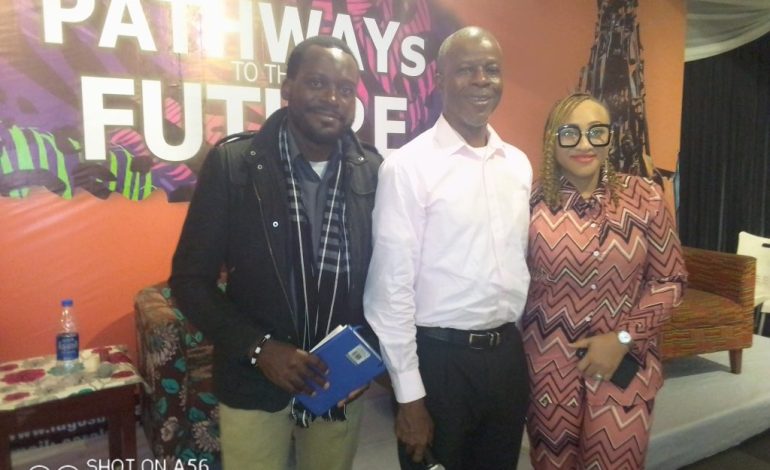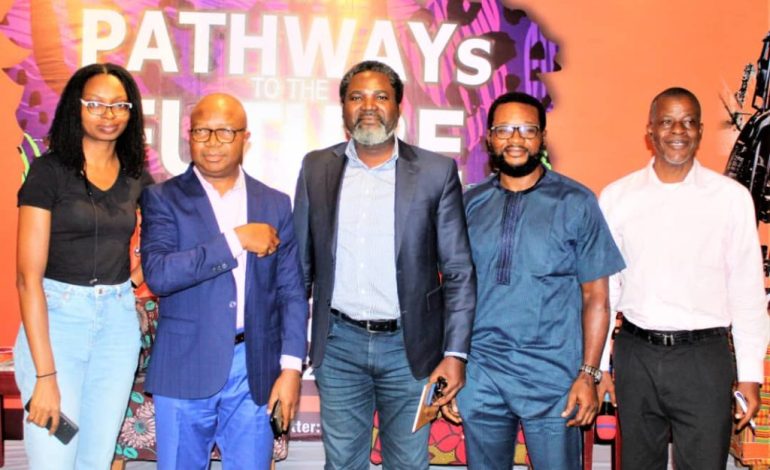Again, stakeholders canvass innovative ways of strengthening book value-chain at LABAF 2022

‘Which Nigeria leader reads and has ever come out with his list of favourite books?
‘There are very few bookstores in Nigeria’

By Anote Ajeluorou
WITH ‘Seamlessly Getting Books to Libraries and Users’ as theme for this year’s Publishers’ Forum at the Lagos Book at Art Festival (LABAF 2022), the session took on a different shade but essentially focused on improving the book trade for the overall benefit of all stakeholders. It was held in collaboration with the Network of Book Clubs and Reading (Culture) Promoters in Nigeria (NBRP), a body vigorously campaigning for the return of book clubs and libraries in neighbourhoods and communities.
‘Pathways to the Future’ is the festival’s overall theme in a year that precedes a major national election. The week-long feast of ideas and life ends on Sunday, November 20, 2022 at its favourite ground, Fredom Park, Lagos Island.
Although the Publishers’ Forum has been a part of LABAF for quite some time, the discussion hasn’t quite moved forward over the years, as it has been more repetitive of same lamentation and agonising without much results. Action is certainly what is required, but it has not been forthcoming. And so what difference would this year’s forum engender to usher in positive results? That was the headache of the panelists and co-convener, NBRP and other stakeholders.
President of NBRP, Mr. Richard Mammah set the tone for the conversation when he reeled out what could be the outcome of the session with probing questions such as “how do we get books seamlessly to readers? How much of our books are connected to the digital system for the global audience? How do stakeholders bind together to form strategies and deliver results? What are the impediments to an effective, workable system? The network of books clubs will convene ‘Lagos Book Walk’ on how to improve the book ecosystem to the Lagos state governor on April 25, 2023, and at the end of the day, a book party will be held. Results of the four panel sessions (today) will coalesce into a ‘Charter of Demands’ we will present to government on what their roles will be going forward.”
Co-founder of RovingHeights Bookstore chain, Adedotun Eyiade, Adachukwu Onwudiwe of Crater Festival, Enugu, creative director in a digital space, Sam Adeoye joined the session virtually while poet, publisher and organiser of Benue Book and Art Festival, Su’eddie Vershima Agema formed the first panel, with publisher Amarachukwu Chimeka of Purple Shelves moderating were on site festival ground. Eyiade canvassed the need to get books quicker and faster to readers and end-users. He also canvassed digital or online platforms for selling books alongside physical ones as how the future of books looks, noting that addressing access to books is RovingHeights’ major concern.
Onwudiwe, also a librarian, said Nigerian libraries were without books, but that books were selling in the marketplace. She noted that booksellers and the recent phenomenon of private libraries were doing a lot to get books to users, but wondered exactly what people really want to read, adding, “We should stick to what we do and get books to children and teenagers, so that when they are economically independent they can buy books themselves. That way, books don’t become third to fourth place in their pyramid of needs.”
For Agema, festivals and prizes are other ways of making books readily available to readers. He also stressed collaboration as a missing link in the book value chain, and noted that players in the sector see themselves as competitors rather partners pursuing a shared vision of educating the populace through provision of reading materials. He said until effective collaboration is entrenched, it would be difficult to move the sector forward. He also said books on literary criticism were also important but lacking in the market and called for the availability of books that create a canon for Nigerian literature.
According to Agema, “We need to have festivals like LABAF, which is the best place to sell books, because of the convergence of authors and readers. We also have to create book prizes, as people are drawn to books that win prizes. The more prizes you have the more recognition you give to the writers and the (winning) books. We need to do more collaborations. Clearly, everybody is doing stuffs to move the sector forward (in their own ways), but collaboration is key (but lacking). We just have to find ways of collaborating; we need to look at what we’re doing at the moment. We also need to get more critical books into the market. We need to infiltrate the school system more through whatever means possible.”
However, for Adeoye writers need to research the market to find out the types of books that appeal to readers and write accordingly. He pointed at books that are entertaining but which might not be literary types, as a starting point. He referred to Fifty Shades by E.L. James, as a book that sold in millions even if it’s not a serious book but because of its appeal. Although a foreign book, Adeoye said Fifty Shades has implications for the Nigerian market on how books are structured. Adeoye also made important note about viewing a book as any other product and should be treated as such, with all the gamut of product marketing and communications that should go with it, although he conceded to the paucity of funding available to writers on account of poor sales.
Adeoye also tasked literary bodies like Association of Nigerian Authors (ANA) to be more strategic in its thinking about book business, adding that “ANA should have a sub-section for (book) marketing or business that can also campaign about its products for sale. Authors and publishers can form some sort of consortium or collective for the purpose of selling books.”
But Agema pushed this proposition forward to by urging publishers to engage in corporate social responsibility (CSR), as a strategic means of warming themselves into the heart of communities where they operate and other unconventional modes of making books available to readers. “Publishers need to do CSR to warm their way into readers’ minds,” he said. “Also on collaboration, we should find out what books sell. We need to have creative mindset, even if it means selling books in boots of cars and using our networks. We need to stop seeing ourselves as competitors or rivals but as collaborators and network and have feedbacks
“Having a product doesn’t mean people will want it,” Adeoye said, “So we ask the question: do people actually want to get this product? We need to create books that appeal to the mass audience. Writing books and making money need not be mutually exclusive. So let’s talk about the product. We need to consider who is going to consume the product, who it’s meant for. So product presentation is important, because literary acclaim and financial success are not mutually exclusive of each other.”
But Eyiade countered the product appeal claim proposition by Adeoye, saying it’s not a product problem that Nigerian books have but access to books. He noted that there is an avalanche of African literary books to choose from, but posited, “We’re not commercially minded. We should think of books that will resonate well with the market. There are very few bookstores in Nigeria. So what about considering such places as pharmacy stores, spa and beauty parlours, supermarkets, etc. We need to start thinking about (unconventional) spaces to stock books, more creative ways of selling and getting books to readers apart from the traditional means.”
While Onwudiwe endorsed collaboration as canvassed by Agema, she also said making catalogue of books available as a form of promotional material for books serves a useful purpose as it furnishes the public with information about the books available from either a publisher or a bookstore, which in turn helps readers to make informed decisions about what to buy and where to buy it. She also proposed the idea of literary tourism as a possible way of addressing the broken book value chain.
“I think we need to collaborate like Agemna said to promote books,” according to Onwudiwe. “We also neglect what catalogues can do as promotional tools. We should encourage every publisher to have catalogues of their books and distribute same to various places.”
In all the submissions, the absence of governments at various tiers in the book equation was so glaring that stakeholders never even bothered about their existence, as hey have largely been absent in the people’s lives. Agena lamented the inability of government to implement policies that give direction, saying, “What government wants to do it does, but are books the priority of government?” Agema’s submission was an obviously biting sarcasm and euphemism for government’s warped priorities that exclude books and the education of citizens, with the recent eight months’ strike action by university teachers as a shameful case in point. A glaring case is Olusegun Obasanjo’s President Libraries that is working while the National Library of Nigeria edifice which construction he inaugurated while office but is yet to be completed years after.

Agema pointed out ways government could step in to make books and writing cool: “Government can give grants and then implement policies to safeguard rights and writers and publishers. Local governments can organise events that recognise writers and give them certificates as means recognition of their roles as something worthwhile. Governments can also create certain portfolios like Honorary Citizen for outstanding writers, like giving the key of a city as symbolic gesture of goodwill and contribution to society.”
Eyiade also took on government and asked for greater scrutiny of the Tertiary Education Trust Fund (TETFund) Act, and sued for immediate review of the policy to include renovation and stocking of Nigerian libraries, from federal to state-owned libraries, with books. He also sued for optimism among those in the book value chain, arguing for more collaborations and the need to work together.
In summing up, the moderator hinted at what is unarguably the season of anomie bedevilling the book and educational sector. Chimeka recalled an earlier submission that was made in a recent book event in Accra, Ghana, saying the same is true of Nigerian leaders, who because they are themselves averse to reading and books, treat them as non-existent entities: “If we have more readers in government, we shouldn’t be talking about these issues. Former US President Barrack Obama comes out every year to talk about the best books he’d read!”
The parting question then is: Which Nigeria leader reads and has ever come out with his list of favourite books that the populace would race to read as source of promotion for such books? Shamefully, none whatsoever.



